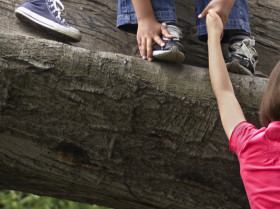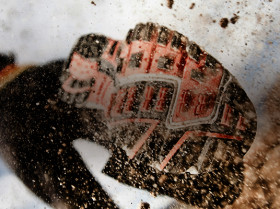
Setting the Stage
Not unlike many female soccer players, “The 99’ers” served as an inspiration to me. I played the highest level of university soccer in Canada (94-97). At that time, the Canadian national team couldn’t compete with the US Team the way it did last summer in London. So, Mia Hamm and the gang were our heroes too. And, while Charmaine Hooper was certainly in the same category as each member of the US team, she was in a class of her own on the Canadian squad.
So, of course, I have followed Julie Foudy (and her 99’er teammates) through the years. I looked up to her then, and I look up to her now. I appreciate her commentating and all of her work in sport. She’s bright, funny, and articulate - and, perhaps what I appreciate the most - she's not afraid to be outspoken and call people out on things.

The positive impact of the 99ers remains today. They have paved the way for many girls and women to follow in their cleats. Yet, at the same time, there is a danger when highly competitive and EXTREMELY competent athletes speak on their opinions youth sport. And, I wouldn’t be surprised if Wikipedia has the 99ers’ picture aligned with their definitions of both competent and competitive. I think we should certainly listen and respect their opinions, but recognize that this level of athlete represents the very smallest fraction of the youth who shows up to little leagues across the country.
Why do Parents Enroll Youth in Sport?
Well, perhaps the better question is why do youth choose to play sports? Here are their answers:
- To have fun.
- To meet friends.
- To feel good and be healthy.
- To work with a team.
- To learn life skills (commitment, dedication, working through a problem).
So why, if the above list are the reasons why youth choose to play sport, is celebrating their participation so bad? Why do professional athletes truly believe they know what's best for youth sport if they are not immersed with the research on youth sport, health, and physical literacy?
Can they learn to lose in other areas?
The psychomotor domain is one that must be developed in kids. We can’t mess with it. Fundamental movement skills are the building blocks to physical literacy. Without them, movement skills can't be combined and demonstrated competently and confidently in game-play as youth age.
Motivation can be intrinsic and extrinsic. Most kids respond to both and extrinsic motivation plays an important role at ages when kids can’t fully understand and value the importance of being physically active for health benefit. If we promote winning too much at young ages (i.e., give only trophies for kids who “win” a game), we potentially fail to teach skills and tactics most important in developing them long-term as athletes in their respective sports (yes, sports - hopefully they play more than one). Moreover, we are turning off the ones who need the physical activity the most because they are likely the least competent (and the most likely to grow up and be physically inactive).
Thus, in my opinion, I think it's stupid to give any trophies at this age. When we place youth in adult versions of sport the focus is on the outcome and not on youth's development in the skills and games sense strategies and tactics. Thus, we fail to help youth reach their potential. Youth are dropping out of sport because they are not competent and their parents can't afford to travel as though they were collegiate athletes despite their being age 7, not because they perhaps received a participation trophy when they were 7 years old. And, they are not competent because too often youth sport is structured as adult version of sport rather than modifying field space and the objects of games to maximize their development.
So, I'll ask this question:
Is it really that bad to applaud participation in sport at the youth levels?
I don’t think it is - but I see this blog as a space to begin the conversation, not a place for me to simply “respond” to a tweet that leaves a lot open to interpretation. Why, you might ask? Well, the way I see it (as an every day mom/non-pro athlete who works her butt off each day to raising two kids, cooking healthy meals, doing laundry, growing a business, and working out each morning at zero dark hundred each morning and each night after I tuck my cherubs in) we can applaud it, but we don't need a trophy. At the same time, I'm not convinced we need a trophy for youth championships, either. How about we bring back play for the joy of it and for the health of it?
Kids learn how to lose every freaking day.
- Many don’t have access to many sport options
- Many don’t fit in with peers at school
- Many don’t have the trendy clothing
- Many can’t afford post-secondary education
- Many don’t live in the “right” neighborhood
- Many don’t have supportive parent(s)/guardian(s)
- Many are sedentary and thus far from reaching their potential in the classroom, socially, and in sport
You see....
Consistent physical activity (at moderate to vigorous intensities) leads to:
- Decrease in depression
- Increase in feelings of empowerment
- Decreases onset of many diseases (Type 2 diabetes, cancer, etc.)
- Increase in feeling of accomplishment
- Potential for positive social benefit
- Decrease in stress
- Increased social capital
So, I’ll say it. I think it’s okay for kids who truly “show up” to be told that it is appreciated that they did so. They might not fully understand the benefit (reward) of living a healthy active life when they are too young to comprehend its benefits. Additionally, if a team accomplished its goals, there are many instances that they should feel successful - like winners - even if the score board says that they lose. So, suffice to say, when I talk about “show up” I don't mean just in the physical context. They have to:
- Give their best effort
- Behave as an effective and positive teammates
- Work toward both individual and team goals
If they are at practice or a game - yet roll their eyes, stomp their feet, and forget that there is no “I” in “Team”, they weren’t a positive participant. That, in my humble opinion, is an entirely different story. I wouldn’t reward this behavior with a participation certificate or anything. I suppose I might be suggesting a character acknowledgement; yet, that doesn't feel right either because I believe we should teach good character because it's the right thing to do, not because there is a carrot waving at the end of the stick. Bribing kids is disrespectful to them, I believe kids are amazing and will do the right thing if they are guided to understand what that is and why they should do is. This is why I also don't like Positive Intervention Behavior Support (PIBS) in our schools.
Taking the thought a step further...
If coaches aren’t creating spaces for all kids to have opportunities to improve and succeed (differentiate instruction, realistic SMART goals) then we (coaches) have to take ownership. We can’t expect kids to give their best effort if the environment is humiliating and disrespectful.
By taking the stance that the purpose of sport is to learn how to “win” and “lose” - I think we are missing the boat. In my humble opinion, when I think of the purpose of sport...
“The purpose of sport is to build competence, and confidence in participants.”
“The purpose of sport is to learn how to collaborate with others.”
“The purpose of sport is to learn how good it feels to give personal best effort.”
“The purpose of sport is to learn about physically active behaviors, and positive life skills can impact their short and long-term health (physical, emotional, mental).”
(or, something like this).
But, we want kids to work hard, and to strive for excellence...
Me, too! That’s why I promote a task-involved motivational climate. One where coaches and physical educators focus on meeting goals, giving absolute best effort, etc. The environment can be planned in a way where success is defined in a more inclusive way - a way that won’t encourage kids to quit sport. We want them playing sport. Sport is awesome. I am not sure giving a certification for participation is going to hinder the top athletes...but, it may make those who are born with unlucky genetics and who struggle in sport settings feel like there is a place in sport for them.
I don’t advocate for grades in physical education on participation as I think it should be an expectation. And, I think that’s (perhaps?) what Foudy is saying. (Hard to know with that dang 140 character limit). But, in sport and physical education, I think there is room for both recognizing key components of positively participating without omitting ‘winning’ and ‘losing’. It’s okay for kids to learn how to win and lose graciously, but I think it’s important to clearly define how one “wins” in a modified game or activity setting.
The point is, the objective that defines winning and losing is key. In little leagues, it shouldn’t be who wins the adult version of the game. Rather, it could be (for example) who had the most complete passes in their small sided game was the winner. Yet, if a team didn’t have the most passes but each team member communicated effectively, worked as hard as they could, and certainly improved - it’s okay to comment on the positives around this. You’re rewarding them in your words for really “showing up” not just being there.
The world never needed kids to learn lessons from sport more than it does today. No pressure.





